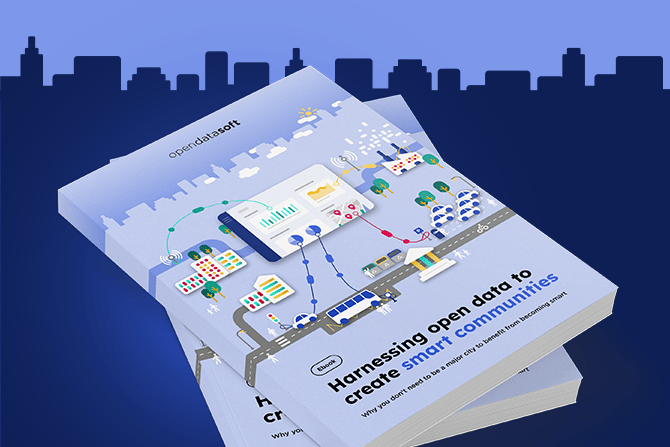The importance of urban data exchanges to building smart cities

Data drives effective, well-functioning smart cities and helps build local ecosystems that bring together all stakeholders to meet the needs of the entire community. However, sharing data between stakeholders can be difficult - based on recent Gartner research we explain how urban data exchanges transform smart city data sharing.
Making cities smarter is becoming essential to delivering on the changing needs of citizens and businesses, while meeting challenging goals and targets around greater efficiency and sustainability.
With Internet of Things (IoT) sensors and seamless connectivity becoming ubiquitous, cities are now creating and collecting growing volumes of data, often in real-time. Harnessing this effectively and sharing it internally, with citizens and across ecosystems is therefore at the heart of building smart communities. However, data can be scattered across the organization, and produced in a range of different formats, making sharing hard. That’s where urban data marketplaces deliver real benefits, centralizing data and making it easily available through an intuitive interface that provides a tailored experience for every different audience. This blog explores what an urban data exchange is, the benefits they bring, and how they can be successfully implemented.
What is an urban data exchange?
Gartner’s Hype Cycle for Smart City Technologies and Solutions, 2024, outlines the high-impact technologies that underpin successful smart cities. Written by analyst Bettina Tratz-Ryan, it lists urban data exchanges as an emerging solution that can have transformational benefits for smart cities.
Similar to data exchanges within the private sector, an urban data exchange enables the sharing of data between different internal and external stakeholders within the smart city ecosystem, creating value for all parties and society as a whole. They allow access for the right people, to the right data, at the right time, driving efficiency, innovation, transparency, sustainability, and financial value.
While much of this data will be generated by the smart city itself, such as information from business systems or traffic, footfall or environmental sensors, other data assets will come from partners, such as mobility operators, businesses or mobile network operators.
What benefits do urban data exchanges deliver?
Sharing data across smart city ecosystems delivers a wide range of benefits:
Greater efficiency
Automating previously manual processes through data sharing delivers major internal efficiency benefits to municipalities and cities. By making data easily discoverable and usable, urban data exchanges encourage greater reuse of data, removing duplication or manual data re-entry. For example, planning teams in the Town of Cary in North Carolina can access census and other data from its central data exchange portal when creating regular reports, avoiding the need to recreate research and ensuring consistency as well as efficiency.
Greater trust
It is vital that citizens and local businesses are able to monitor municipalities and cities and hold them to account. Data sharing is central to creating transparency and trust, demonstrating that councils and councilors are working effectively for their communities. As part of its objective to deepen trust, Frankston City Council in Australia has created its Transparency Hub. This is a user-friendly space that allows the community to easily access, understand, explore and visualize the council’s data. It brings together a broad range of data sources, providing an overview of Frankston City Council’s decision-making and activities, including councilor voting records and council financial information. As well as providing data stories and visualizations, there are clear links to the raw data if users wish to access it.
Greater innovation and collaboration
Given the wide range of activities they are involved in, traditionally municipalities have been structured in distinct departments, focused on specific areas, such as permitting, public parks or traffic management. While this increases efficiency, it can prevent cities from delivering the joined-up, seamless experience that they now need to deliver. Sharing data through an urban data exchange allows teams in different departments to work together and deliver combined services to citizens and businesses. For example, the City of Kingston in Canada has created its MyKingston app to provide a one-stop shop for the community. Fed by information from its data portal, it brings together data from multiple sources and business systems, filtered by the user’s address to give them a personalized view of their city, including their service requests, parking zones and contact details of their councilor.
At the same time, external stakeholders in both the private and public sector can innovate through access to smart city data. Retailers and restaurants can use footfall data to plan opening hours and staffing, automotive companies can use traffic data to offer new services, while technology providers can incorporate data into mobility or tourism apps.
Greater sustainability
Smart cities aim to be customer-centric, efficient and above all sustainable. Urban data exchanges support greater sustainability by sharing real-time sensor data, on everything from current air quality levels to the use of renewable energy and carbon emissions. Not only does this allow citizens and NGOs to hold cities to account, but it also can be used to drive new innovations. For example, data on the availability of electric vehicle charging stations can be used by motorists planning their journeys, while municipalities can show their progress towards the use of renewable power and reducing their own emissions. Demonstrating this, Morrisville in North Carolina shares data on its solar power production as part of its sustainability data story on its data exchange. When fed into smart city digital twins or AI models, data from urban data exchanges also enables “what if” planning, running simulations to predict the sustainability benefits of new infrastructure, such as introducing a bus lane, or banning high-polluting vehicles from certain areas.
Better decision-making and lower risk
Given the complex nature of smart cities, it is vital that they can be managed effectively in real-time to deliver a seamless experience and reduce risk. As well as improving efficiency, urban data exchanges give decision-makers a complete picture of activities and enable them to make instant changes to drive improvements. This could be through rerouting traffic or buses in case of congestion or bad weather. In Cary for example, IoT water sensors monitor local rivers and send alerts when levels hit a certain threshold, with data shared through an interactive, granular public dashboard, which is used for internal decision-making, such as shutting roads, as well as to collaborate with communities upstream and downstream.
As Bettina Tratz-Ryan points out in the report:
The challenges to creating an urban data exchange
Creating an effective urban data exchange requires smart cities to overcome a combination of technical and cultural challenges.
Technical challenges
On the technical side they require an integrated data stack that feeds high-quality information into the urban data exchange. This has to be reliable and up-to-date while protecting confidentiality and personal information, particularly if data is shared outside the organization. It has to be able to connect to a wide range of data sources in order to efficiently collect data in real-time.
The data exchange itself has to be easy and intuitive to use by all audiences, whether internal employees, external stakeholders, or the general public. Access should be as straightforward as buying something from an e-commerce marketplace, with the same seamless experience, powerful search and discovery functions, and the ability to use and download data in a range of formats, from data visualizations to APIs. To ensure privacy, the data exchange has to provide granular access rights, so that more sensitive data is only available to specific, authorized users. All of these factors make building your own data exchange complex and time-consuming. It is therefore simpler to partner with an expert, and buy your technology from a specialized data portal solution provider.
Cultural challenges
On the cultural side, everyone involved within the smart city ecosystem has to put data at the heart of their activities. That requires a focus on building data literacy skills that encourage data democratization and a more collaborative, data centric approach. Silos between departments and external stakeholders need to be broken down, with teams working together more closely using data from the exchange to power new relationships and innovation. There needs to be strong communication about the data that is available and how it can be used, both with internal staff and external stakeholders, especially citizens.
The positive news is that Gartner sees growing momentum behind urban data exchanges, with mainstream adoption taking between two to five years. More and more cities are collecting and orchestrating data from their own and other sources and making them available through urban data exchanges and other data portals.
Urban data exchanges will then provide the backbone for transformation efforts in smart cities, as the report explains:
Want to create an effective urban data marketplace to transform your smart city and maximize value from your data? Book a tailored demo of our solution to learn more!

Across the globe cities and municipalities are transforming themselves into smart cities, improving the urban environment for citizens, visitors, and businesses, while boosting efficiency and sustainability. In this blog we explain what a smart city is and how to build one successfully.

In today’s digital-first world, data sharing and use is essential to effective local government operations. Based on our recent webinar, Opendatasoft customers the City of Kingston and the Town of Cary explain how data portals are helping them to deliver on the needs of their citizens and employees.

How can you create a cost-effective, data-driven smart city? Download our new ebook and learn how harnessing open data can help municipalities create smarter communities: what is a smart city, how does it benefit municipalities and what holds back success? how can you cost-effectively build a smart city? best practice recommendations from industry experts: discover the 10 steps to becoming a smart city using open data examples of use case successes from our customers: Morrisville, Cary, Kingston, Jersey City, Southern Grampians, Western Parkland and Bristol.
